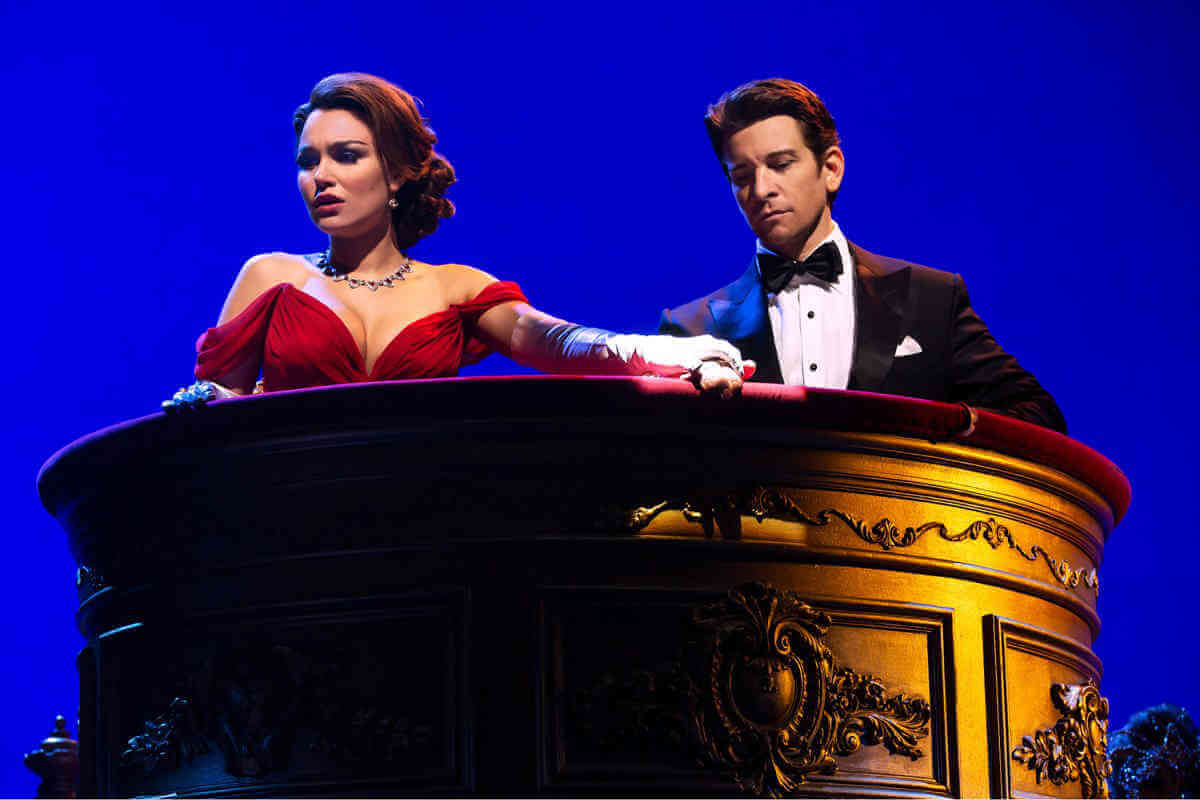The Hollywood prostitute Vivian Ward, the character at the center of the movie-now-musical “Pretty Woman,” consistently refers to herself as a “sure thing.” She’ll deliver the basic goods, no need for any extraordinary attention or seduction. What she promises is a mechanical, largely impersonal transaction — a simulacrum of passion — with no kissing on the mouth because that’s too intimate.
Utter lack of intimacy also defines the apparent approach the creators of the musical — now at the Nederlander, with a book by J. F. Lawton and the late Garry Marshall and a score by Bryan Adams and Jim Vallance — took in translating the 1990 movie to the Broadway stage.
This is a mostly faithful, if workmanlike recreation of the movie with the addition of a banal pop-rock score — an attempt to provide that “sure thing” for undemanding fans of the movie who can be satisfied with a healthy dose of splashy theatrics while seeing their favorite scenes live on stage. It’s an attraction rather than a work of theater, something that pops up frequently on the Broadway scene these days. While it’s cheap, flashy, and tedious, “Pretty Woman” is also pretty much review-proof, and ticket pre-sale has been healthy.
Where “Pretty Woman” has always rankled is in its conceit that with enough money, anyone can become a princess. This isn’t a moral judgment about sex work. Instead, it’s a matter of the plot, having established that Vivian works the streets, minimizing the tension between the worlds of Edward and Vivian, turning her into a street corner Cinderella merely by draping her in some designer duds, a high school dropout who, having turned tricks to survive for a dozen years or so, is suddenly poised and elegant overnight.
Of course this is a fantasy — a very popular one. The “instant princess” trope is an enduring narrative staple. Stephen Sondheim wrote about it in “Saturday Night,” in a wry song about how reality and fantasy collide: “In the movies, when a girl has come from the wrong side of the tracks/ In a week, she has a wealthy chum who can buy her presents at Saks.” The comedy of the song comes from its acknowledgement that real life is considerably more prosaic.
But why not just sit back and enjoy the dream rather than getting all curmudgeonly about it? If the show were better crafted, that would certainly make for a worthwhile evening. “My Fair Lady” is not realistic — and it’s wonderful. Then there’s that other musical about a very rich man exploiting a plucky — if very young — woman to bolster his image. That show, “Annie,” is also a delight. Each of these shows uses a situation’s unreality to explore some human truths and we come to care for the people. And, both shows have unforgettable scores.
“Pretty Woman” has neither score nor substance.
The most memorable scene in “Pretty Woman,” the movie, is when Vivian, dressed to the nines, returns to the store from which she was previously turned away and upbraids the clerks with her line, “Mistake. Big mistake.” In the musical, that moment gets a huge laugh because the entire audience knows it’s coming, but it’s cold and harsh. The moment is essentially the same sort of dramatic triumph as when Eliza finally gets “the rain in Spain stays mainly in the plain” right, but here Vivian’s anger is vengeful and mean-spirited, whereas Eliza’s joy at her success fills a theater. The big mistake is that “Pretty Woman” leaves out the humanity… and you’ll forget the songs by the time you hit the subway.
For Eliza — and Annie, as well — the good fortune is earned. In “Pretty Woman,” though Vivian comes to love Edward, it’s really never clear why — and that’s just weak playwriting. Nor is there any discernible reason why Vivian goes from being tolerated as a wealthy guest’s plaything at the Beverly Wilshire to being the hotel’s darling… except the clothes. Dramatically, it’s nowhere near enough.
Jerry Mitchell’s by-the-numbers direction doesn’t allow for any emotional connection. The characters simply move through the scenes. Fortunately, the simulated sex between Edward and Vivian is a lot less graphic than when I saw this show in Chicago earlier this year, and that’s a blessing. The rest of the staging is blandly derivative. The second act opens with a blatant knockoff of “The Ascot Gavotte” from “My Fair Lady,” but without the wit. There is a character called Happy Man — I kid you not — who weaves through the street scenes making the world of hookers and drug dealers fun and appealing… or trying to. He later becomes the hotel manager. Okay.
The cast does its job. As Edward, one has to feel for Andy Karl, who is handsome, a natural comedian, and easily one of the most talented leading men on Broadway. Yet, once again he is relegated to recreating the musical version of someone else’s famous movie role (“Groundhog Day,” “Rocky,” “Legally Blonde”). As Kit, Vivian’s mentor in the life, Orfeh delivers a brassy turn that breathes some actual life into the undertaking. Eric Anderson as Happy Man is certainly charming, and it’s always great to see Jason Danieley, who plays Edward’s lawyer in suitably evil and smarmy style.
The casting problem here is the performance of Samantha Barks as Vivian. She is not much more than a mannequin for Gregg Barnes’ recreations (with some nice interpretations) of the movie’s clothes. Banks’ singing is artless and often piercing, and her Vivian lacks any believable complexity. Worse, there is no chemistry between Banks and Karl, and that makes the show cool and distant when it should be hot and filled with sexual tension.
There is no shortage of “fallen women” who have enlivened musicals over the years with complex, fascinating, and rich characters — Nancy in “Oliver,” Charity in “Sweet Charity,” the whole demi-monde of “The Life,” to name just three. Vivian Ward is not one of those.
PRETTY WOMAN | Nederlander Theatre, 208 W. 41st St. | Tue., Thu. at 7 p.m.; Wed., Fri.-Sat. at 8 p.m.; Wed., Sat. at 2 p.m.; Sun at 3 p.m. | $99-$275 at ticketmaster.com or 870-250-2929 | Two hrs., 30 mins., with intermission
































